Last Updated on November 14, 2025
Expert Boiler Installation in Thornton
Do you need expert boiler installation services in Thornton, West Yorkshire? Upgrading your residential or commercial boiler will result in lower energy bills, enhanced energy efficiency, and a decreased negative environmental impact.
Choosing the right boiler size for your property is vital in ensuring that your home and business will have reliable heating. Additionally, an incorrectly fitted boiler can cause many issues, including inefficient heating, high energy bills, and safety hazards.
With the long list of boiler types and sizes, you will need expert guidance to ensure you get the right boiler for your property.
That’s where Eco Happy comes in. We have assisted thousands of homes and businesses with choosing the right boiler to suit their needs. We also ensure lower energy bills and improved energy efficiency. Our local Gas Safe registered engineers will expertly install your boiler.
Your quote is almost
in your inbox
Just a few more details are needed.
What Type Of Boiler Do You Need?
The type of boiler you need depends on the following factors:
- Hot water demand: The demand for hot water will determine the boiler you will need for your property.
- Property size: Whether you have a large or small property will influence what kind of boiler you need to supply sufficient heat and/or hot water.
- Personal goals regarding energy efficiency: The boiler you choose must have a high energy-efficiency rating and be compatible with renewable energy sources like solar panels.
- Budget: Your budget will be significant when deciding what boiler to install on your property.
Below are some of the most common boiler types. We will discuss their suitability for different properties depending on heat requirements.
Combi boiler
Combi boilers are compact, single-unit central heating systems that eliminate the need for separate hot or cold water tanks. They draw water directly from the mains supply for heating and hot water. Since these boilers heat water on demand, they’re highly energy efficient.
They can run on gas, oil or electricity.
Their compact size makes them easy to install and ideal for smaller homes or apartments with one or two bathrooms.
The only con to combi boilers is their heat output. Due to their size, they would be inefficient in heating larger properties with high heat demands and multiple hot water outlets.
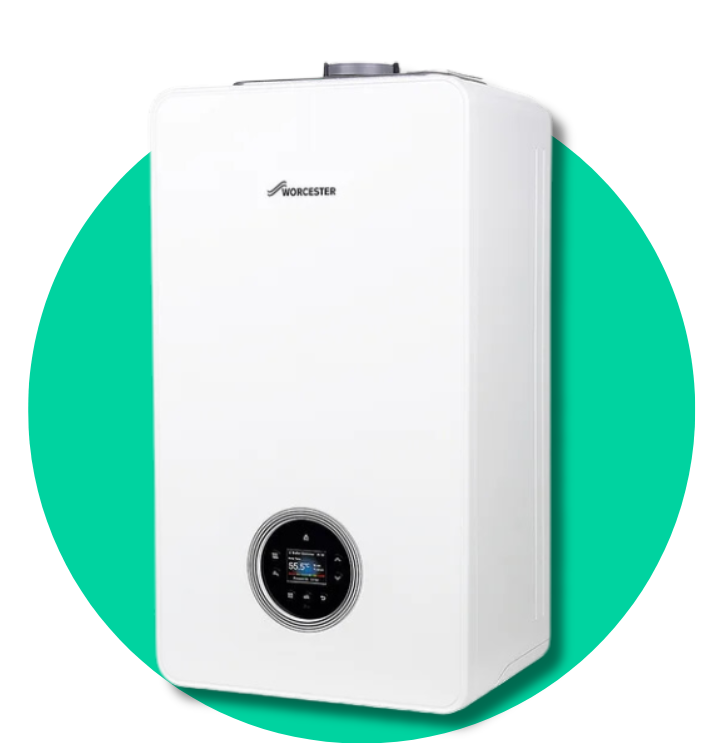
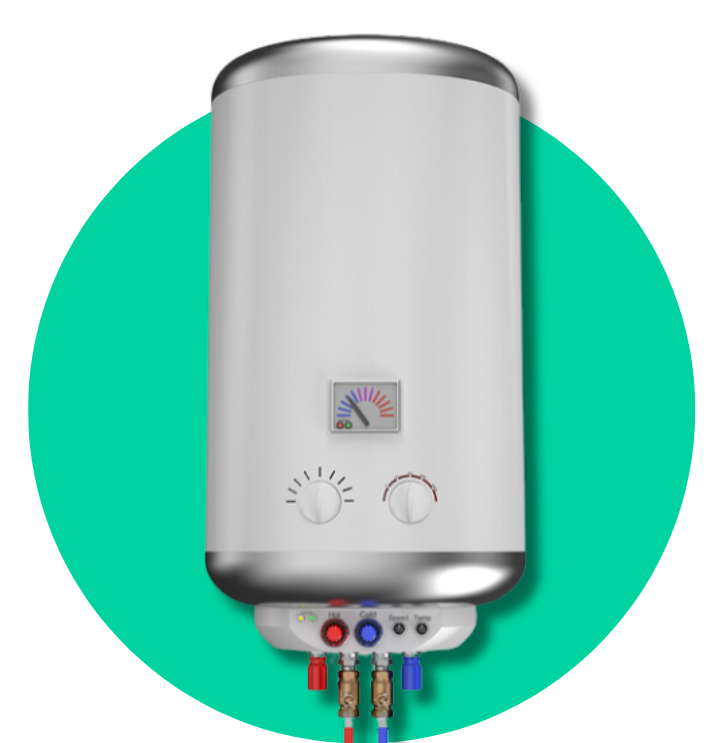
System boiler
System boilers use a heat exchanger, which heats water through a gas or oil-powered burner. The heated water is stored in a separate hot water tank. Due to their size, system boilers require a lot of space for installation.
System boilers can supply a large amount of hot water to properties with multiple taps, showers, and central heating systems simultaneously.
These boilers are ideal for large residential properties or small businesses with high hot water demands.
Conventional boiler
Conventional or traditional boilers are currently the most used boilers in homes throughout the UK. Their design is straightforward, making it easier for heat engineers to do repairs. Their durability also means that if you care for them well enough with yearly servicing, they could last you for a considerable time.
Conventional boilers are powered by gas or oil and function similarly to a system boiler, using a heat exchanger. The hot water is then stored in a separate hot water cylinder. The main difference is that conventional boilers also make use of a cold water storage tank, usually located in the loft.
These boilers provide heat and hot water for central heating systems and taps simultaneously. This makes them a good option for properties with several bathrooms and radiators.
It is important to note that conventional boilers are being phased out in the UK due to their carbon emissions. A better long-term option may be a system or electric boiler for your property.
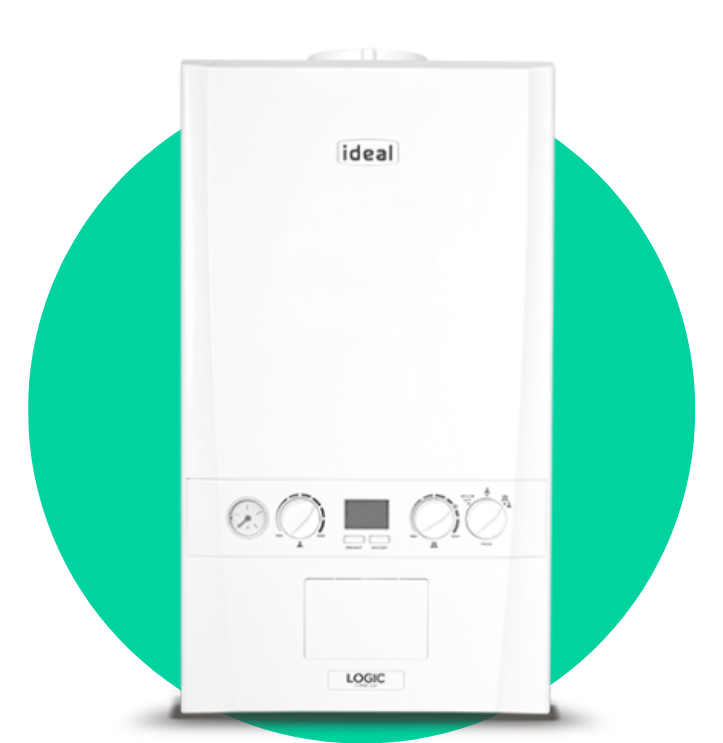
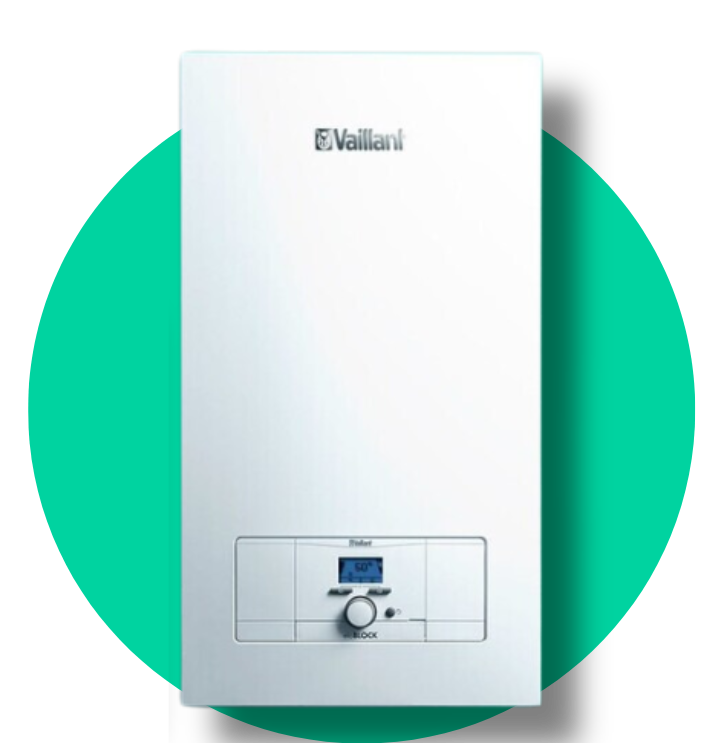
Electric boiler
Electric boilers use electricity to heat water by heating an element that then heats up the water.
Traditional electric boilers have a separate tank to store hot water, so they are best used for larger properties with more bathrooms and rooms. However, electric combi boilers are a single unit, making them a good option if you have a smaller property with a few radiators and lower hot water demand.
Electric boilers don’t use fossil fuels and are compatible with renewable energy sources, like solar panels. This makes them reliable, energy-efficient, and a great option if you want to decrease your carbon footprint.
They typically require much less space to install than oil or gas boilers, as they don’t produce combustion gases. This means that, unlike gas or oil boilers, they don’t require a chimney or flue. For this reason, they are best for smaller homes, semi-detached townhouses, or apartments.
Their only downfall is that they are costly to run. Their running costs are more expensive than gas or oil boilers, as electricity costs more per kilowatt hour than gas or oil.
Biomass boiler
Biomass boilers are the best option for businesses or large homes that want to reduce their carbon footprint and fuel costs.
These boilers use organic, renewable materials to produce heat, such as wood, logs, straw, chips, or pellets.
Although biomass boilers are cheaper to fuel than other boilers, their upfront costs are exponentially higher. However, there are government schemes in the UK that offer subsidies of up to £50,000 to individuals and businesses to encourage them to switch to more energy-efficient power solutions. The ECO4 government scheme is one such scheme.
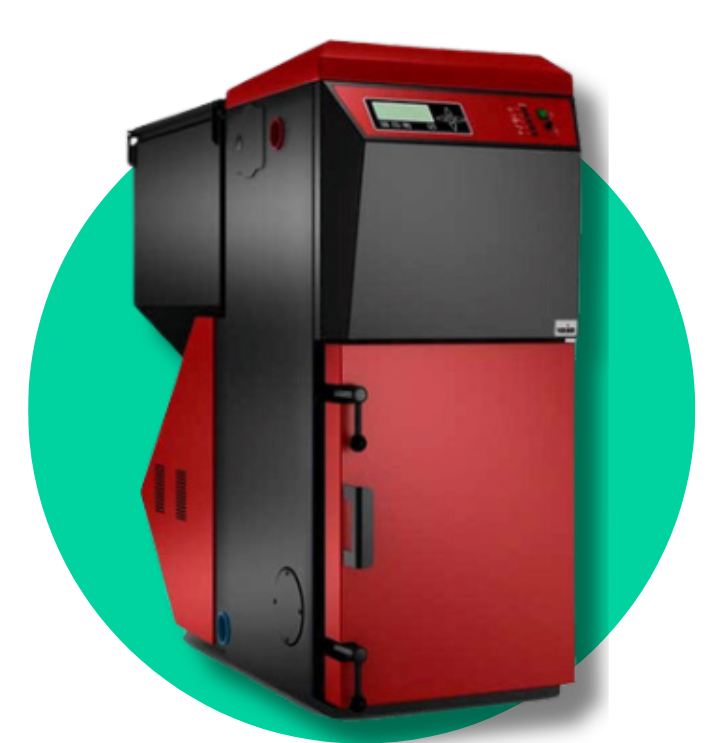
How Much Does It Cost To Install A New Boiler In Thornton?
The cost of installing a new boiler will depend on a number of factors:
- Removal and disposal of your old boiler.
- Boiler type.
- Installation complexity.
- Labour.
- Property size.
- Changes to your pipework.
- Location change of where you usually keep your boiler.
- Replacing your current boiler with a different type of boiler (if you are replacing an electric boiler with a gas boiler, the installation may take longer).
Below are estimated costs for installing a new boiler in homes and commercial businesses.
New Boiler Costs For Homes
One-bedroom home
| Boiler type | Cost (excluding installation) | Cost (including Installation) | Average cost (with installation) |
|---|---|---|---|
| Combi | £600 – £2,500 | £1,600 – £3,500 | £2,550 |
| System | £600 – £2,500 | £1,800 – £3,400 | £2,600 |
| Conventional | £600 – £2,500 | £1,800 – £3,500 | £2,650 |
| Electric | £550 – £2,500 | £1,450 – £3,500 | £2,475 |
| Biomass | £4,000 – £8,000 | £6,000 – £10,000 | £8,000 |
Two-bedroom home
| Boiler type | Cost (excluding installation) | Cost (including Installation) | Average cost (with installation) |
|---|---|---|---|
| Combi | £600 – £2,500 | £1,700 – £4,000 | £2,850 |
| System | £600 – £3,000 | £1,800 – £4,000 | £2,900 |
| Conventional | £600 – £2,800 | £2,000 – £4,000 | £3,000 |
| Electric | £600 – £2,600 | £1,600 – £3,900 | £2,750 |
| Biomass | £5,000 – £10,000 | £8,000 – £12,000 | £10,000 |
Three to four-bedroom home
| Boiler type | Cost (excluding installation) | Cost (including Installation) | Average cost (with installation) |
|---|---|---|---|
| Combi | £1,400 – £3,000 | £2,600 – £4,500 | £3,550 |
| System | £1,500 – £3,700 | £2,600 – £4,700 | £3,650 |
| Conventional | £1,500 – £3,700 | £2,700 – £4,900 | £3,800 |
| Electric | £1,400 – £3,300 | £2,500 – £4,500 | £3,500 |
| Biomass | £7,000 – £14,000 | £10,000 – £18,000 | £14,000 |
Five or more bedroom homes
| Boiler type | Cost (excluding installation) | Cost (including Installation) | Average cost (with installation) |
|---|---|---|---|
| Combi | £1,500 – £3,500 | £2,600 – £4,500+ | £3,550 |
| System | £1,600 – £4,300 | £3,000 – £5,000+ | £4,000 |
| Conventional | £1,600 – £4,500 | £2,900 – £5,000+ | £3,950 |
| Electric | £1,550 – £3,500 | £2,500 – £4,500+ | £3,500 |
| Biomass | £8,000 – £15,000 | £10,000 – £20,000+ | £15,000 |
New boiler costs for commercial businesses
Depending on whether your commercial property is small, medium-sized or large, installing a new boiler will come at different costs. Below are the estimated costs.
Small businesses
| Boiler type | Cost (excluding installation) | Cost (including Installation) | Average cost (with installation) |
|---|---|---|---|
| Combi | £600 – £2,000 | £1,900 – £3,300 | £2,600 |
| System | £600 – £2,900 | £600 – £3,500 | £2,050 |
| Conventional | £600 – £2,700 | £1,800 – £4,000 | £2,900 |
| Electric | £550 – £1,750 | £1,900 – £3,000 | £2,450 |
| Biomass | £5,000 – £10,000 | £10,000 – £16,000 | £13,000 |
Medium-sized businesses
| Boiler type | Cost (excluding installation) | Cost (including Installation) | Average cost (with installation) |
|---|---|---|---|
| Combi | £1,000 – £4,000 | £3,000 – £6,000 | £4,500 |
| System | £1,200 – £5,000 | £3,300 – £7,000 | £5,150 |
| Conventional | £1,200 – £5,000 | £3,200 – £7,000 | £5,100 |
| Electric | £1,200 – £4,000 | £3,200 – £6,500 | £4,850 |
| Biomass | £6,000 – £12,000 | £11,000 – £20,000 | £15,500 |
Large businesses
The most used commercial boilers have an output of around 70kW, which is reliable for small or medium-sized businesses. But, for large businesses with many rooms and water sources, this may not be sufficient. Large-scale businesses usually need a boiler with an output between 100kW and 200kW. These are known as industrial boilers. Installation costs, therefore, range widely here. This is because installations may take longer, sometimes costing over £20,000.
| Boiler type | Cost (excluding installation) | Cost (including Installation) | Average cost (with installation) |
|---|---|---|---|
| System | £5,000- £10,000 | £12,500- £20,000 | Varies |
| Conventional | £5,000- £10,000 | £12,500- £20,000 | Varies |
| Electric | £5,000- £10,000 | £12,500- £20,000 | Varies |
| Biomass | £15,000- £30,000 | £20,000- £40,000 | Varies |
What Size Boiler Do You Need?
Boiler sizes come in many options. Regular boilers are between 10kW to 70kW. However, industrial-scale boilers go up to 100kW and more. The boiler size you need for your property will depend on:
- The property’s size.
- Number of rooms and bathrooms.
- The number of radiators the property has.
- The property’s insulation.
If your property is poorly insulated, it will likely cause major heat loss, meaning you’ll need a more powerful boiler.
What Size Boilers Do Residential Homes Need?
| Number of bedrooms | Number of bathrooms | Number of radiators | Size of boiler | Type of boiler |
|---|---|---|---|---|
| 1-2 | 1 | 0-10 | 18- 27 kW | Combination, conventional, electric |
| 3-4 | 2-3 | 10-15 | 28-34 kW | System or Conventional |
| 5 or more | 4+ | 15 – 20+ | 35-43 kW | Conventional, biomass, system |
What Size Boilers Do Commercial Businesses Need?
The size of your boiler will vary depending on the size of your commercial business. Small to medium-sized businesses will require smaller boilers than large-scale businesses.
Important: Large businesses often need industrial-sized boilers for reliable central heating, which are much larger than the standard boiler sizes used on small and medium-sized commercial properties. These are much more expensive to purchase and install.
| Size | Number of hot water points | Number of radiators | Size of boiler | Type of boiler |
|---|---|---|---|---|
| Small | 1 | 1-9 | 18- 24 kW | Combi, conventional, electric |
| Medium | 3 or more | 10-20 | 35 kW – 45 kW | Conventional, system, electric, biomass |
| Large | Over 20 | 20 or more | 55 kW and more | Conventional, system, biomass |
What Are The Best Boiler Brands?
According to industry experts, these are the top 5 boiler brands in the UK today:
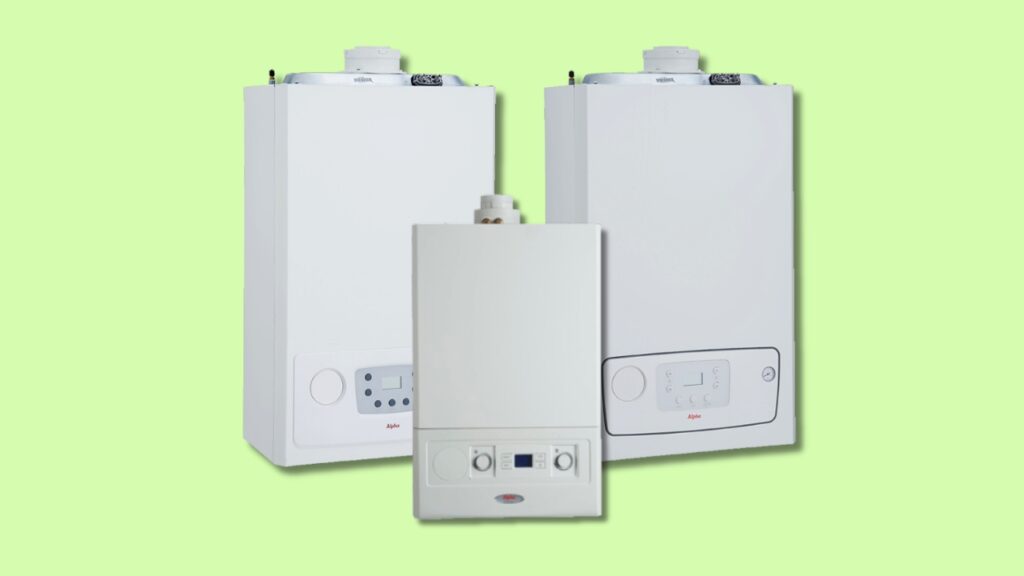
Alpha
Alpha boilers have remained on the top 5 list of best boiler brands in the UK due to their affordability and quality. Their E-Tec Plus combi boiler is one of the most highly recommended boilers on the market. Alpha boilers come with a 10-year warranty.
Viessmann
This century-old brand is still among the UK’s top five boiler brands. Viessman is known for quality and innovation and offers boilers with some modern features, including smart boilers with zone sensors. It provides a 10-year warranty on all its boilers.
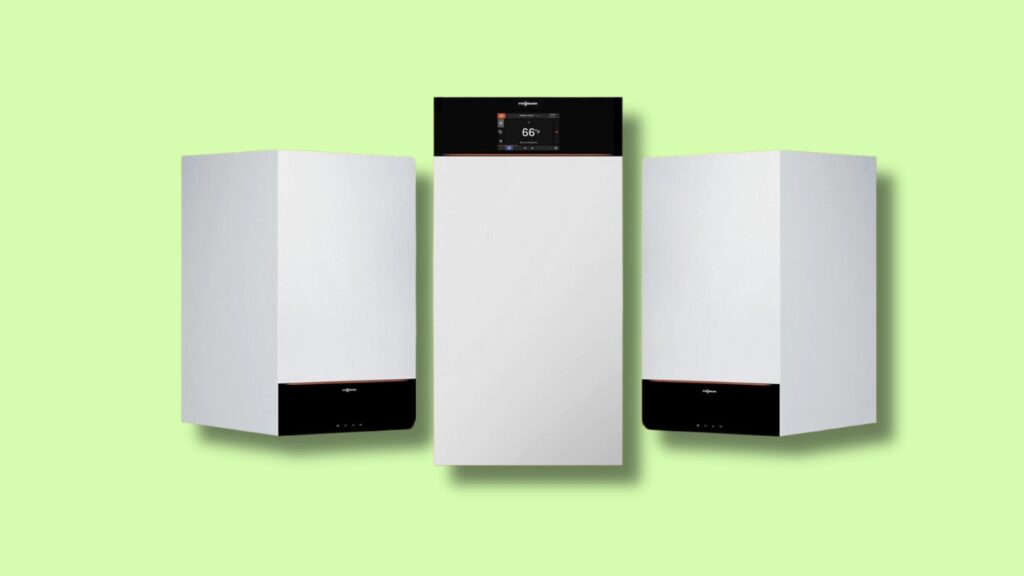
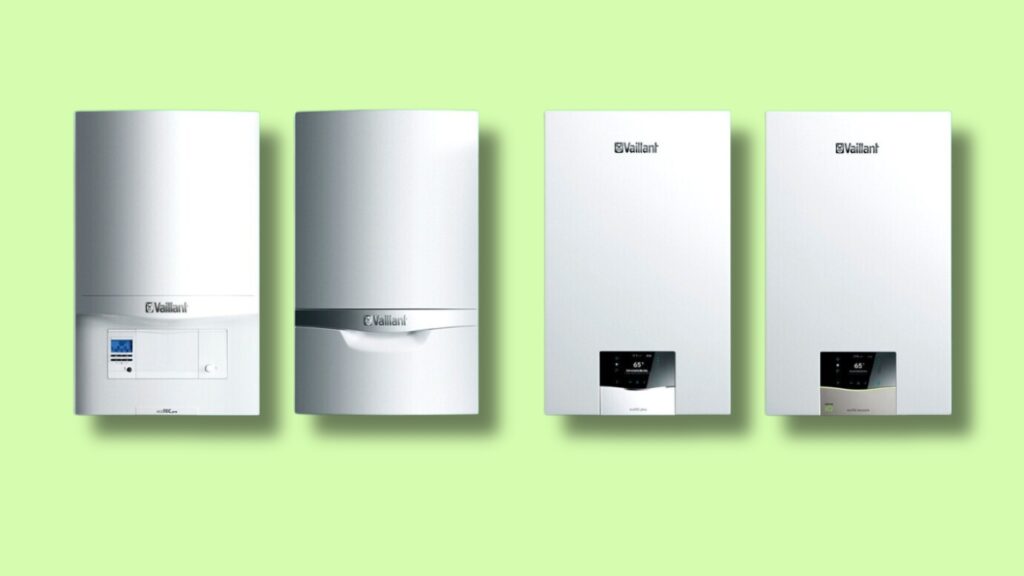
Vaillant
Vaillant is one of the UK’s oldest boiler brands. Its boilers have remained among the top contenders in the UK for over 20 years. Vaillant offers a wide range of boilers, including conventional, combi, and system boilers.
Worcester Bosch
Worchester Bosch stands out amongst boiler brands because of the length of its warranty. They offer a warranty of 12 years, emphasising the brand’s confidence in their products. To top it off, their boilers are also highly affordable.
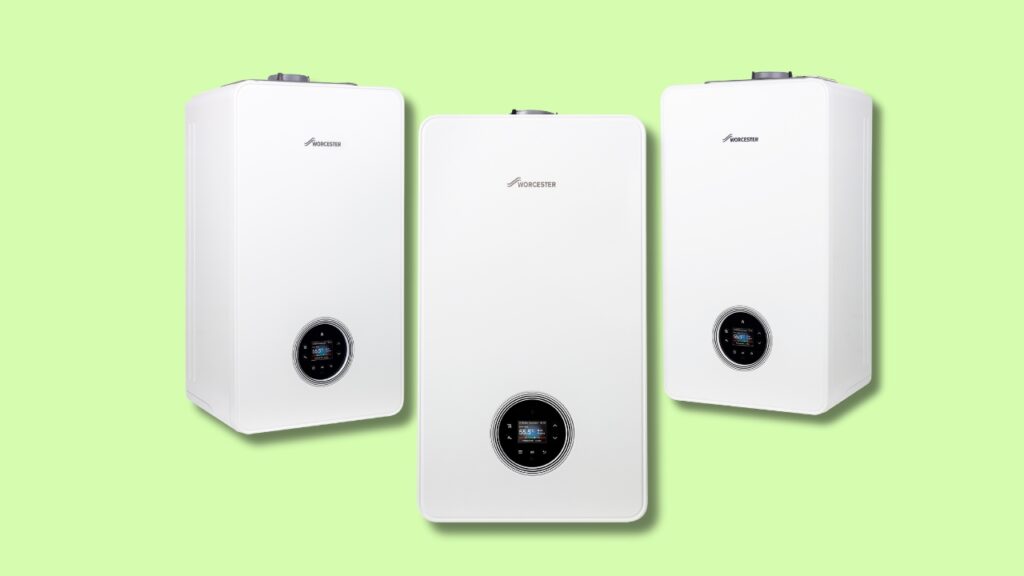
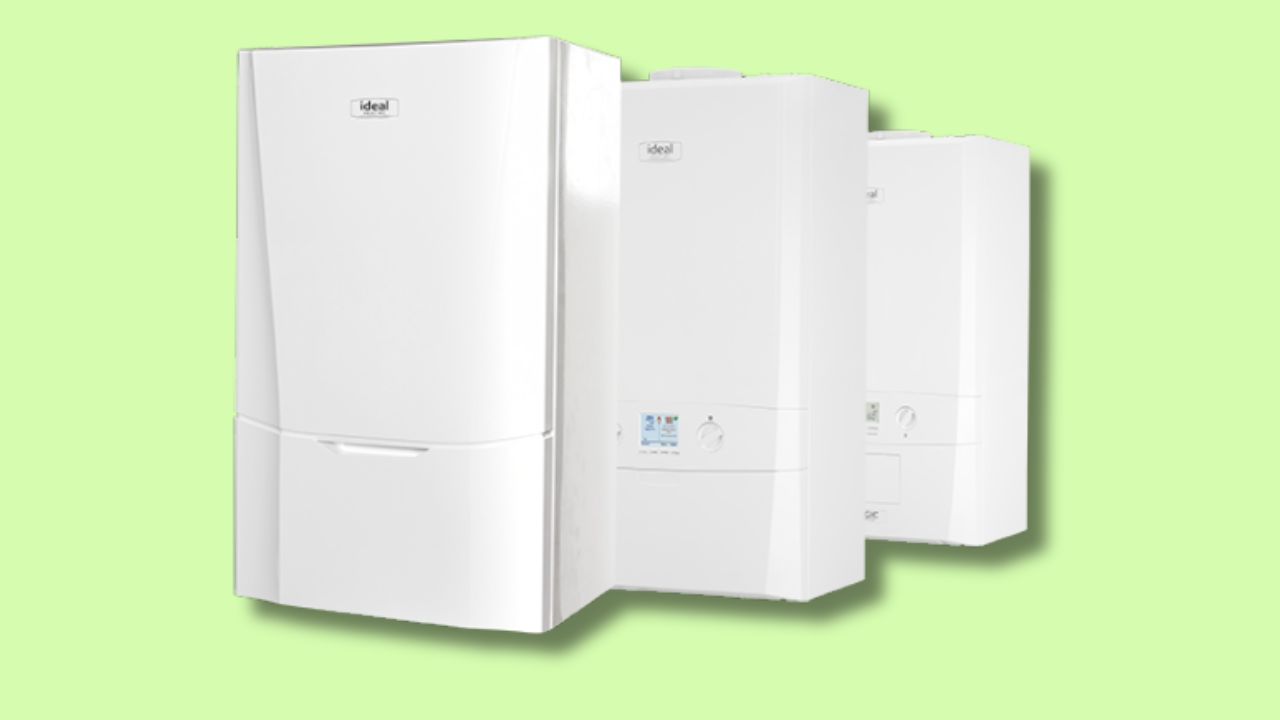
Ideal
With an outstanding reputation for efficiency, Ideal offers conventional, system, and combi boilers of all sizes. Their wide range of boilers cater to everyone’s needs. Their boilers also come with a warranty of 10-12 years.
Why Choose Eco Happy?
Eco Happy is ready to help. Here is why you should consider teaming up with our team of boiler installers in Thornton.
Gas Safe registered
Every engineer at Eco Happy is Gas Safe registered.
Fast response times
No matter the season, when you call us, we will be here to answer your questions and take care of your installations within a few days.
Professional and reliable
Our engineers will be with you every step of the way. From providing advice on which boiler you need to expert-level installation and general support throughout your journey.
Installation of all boiler types
We are highly versatile in our skills and offer installations of combi, system, electric, conventional and biomass boilers of any size.
Customer service
At Eco Happy, our top priority is keeping customers satisfied and informed.
Get Your Boiler Installation Quote Today
Are you thinking of installing a new boiler? Fill out our quick, and easy form for a free quote. We will contact you shortly after with a quote.
FAQs
Do plumbers install boilers?
Only Gas Safe registered plumbers should handle boiler installations. If you get a plumber’s assistance, ask them for their Gas Safe certification. This will ensure that you get safe, expert services.
Can I leave my boiler on all the time?
The short answer is yes. However, this will be less energy-efficient and increase your monthly energy bills. To keep your energy bills low, it is recommended that you switch on your boiler only a couple of hours before you need it.
How long should a new boiler last?
A new boiler should last 10-15 years. This is an estimated time, depending on how often you service your boiler and what type you have installed.
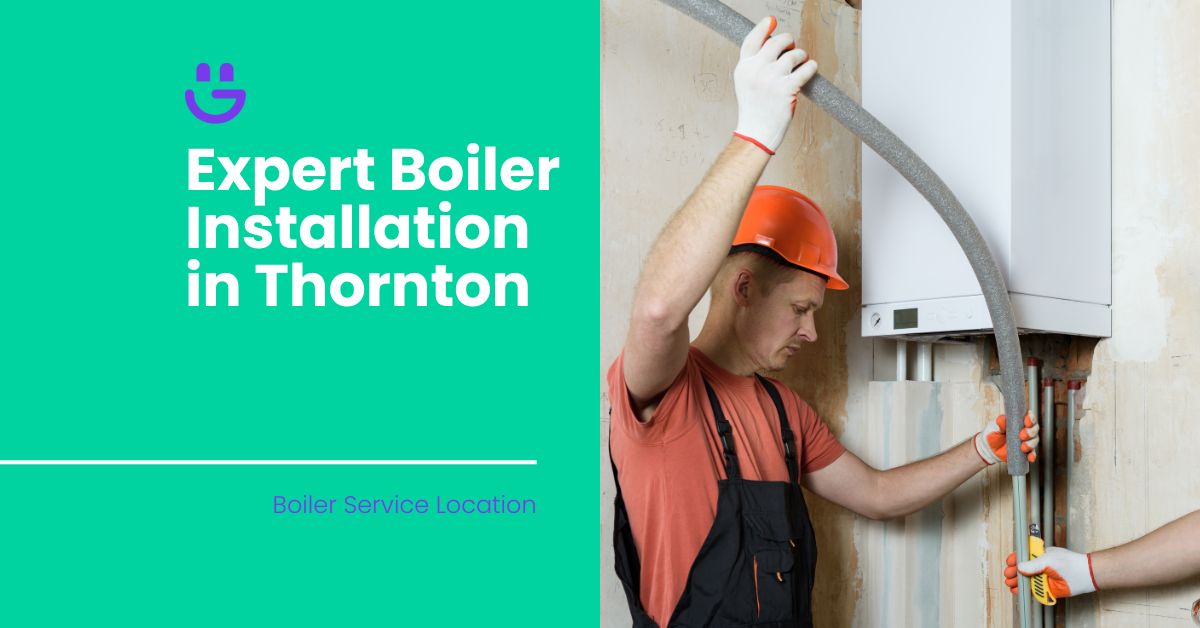





Tom Allen
Solar Expert